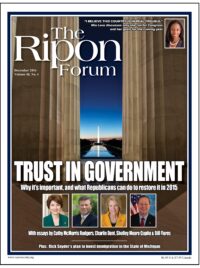 On November 4, 2014, the American people sent a powerful statement, one that resonated from Washington to state capitals around the country. In the marketplace of ideas, our Republican values of freedom, personal responsibility, and a strong national defense, of government that is less expensive and intrusive, yet more effective and accountable, carried the day.
On November 4, 2014, the American people sent a powerful statement, one that resonated from Washington to state capitals around the country. In the marketplace of ideas, our Republican values of freedom, personal responsibility, and a strong national defense, of government that is less expensive and intrusive, yet more effective and accountable, carried the day.
Now, the American people are wondering. Can we deliver? With a new Republican majority in the Senate and an even stronger representation in the House, will the next Congress work together to address issues that truly concern our citizens?
Obviously, the Republican House certainly will find a Republican Senate to be a more willing legislative partner. That comity will be to no avail, however, if we in the Senate continually find ourselves unable to muster the needed Democratic votes to bring cloture, or if Congress passes legislation only to find it blocked by a presidential veto.
So, the real question is this: Was the end of this election the beginning of a period committed to governance or merely the beginning of the 2016 campaign season, with all of the gridlock and divisiveness that implies? More to the point, can the Congress and the White House earn back the trust our citizens deserve to have in their government?
Restoring that trust must be our highest priority. That can only be done if we in Washington work together to get something done. Our first initiatives in the New Year must produce actual results, not bickering and hyper-partisanship.
Our first initiatives in the New Year must produce actual results, not bickering and hyper-partisanship.
In order to do so, we should concentrate on one broad issue that is of great concern to the American people and that transcends party – jobs. With unemployment still too high and with a record number of Americans having withdrawn from the labor market, this is one area in which Republicans and Democrats should come together quickly. I suggest that we focus on three measures which would help create an environment that fosters economic growth and job creation.
One of those measures should be job training. Robust workforce development, ensuring that American workers get the education and training they need to compete in the 21st Century, must be a top priority. I have met with business owners in my home state of Maine who have jobs available but cannot find qualified and trained workers to fill these vacant positions. It is estimated that one-third of the U.S. unemployment rate is due to the imbalance between workers’ skills and open jobs. The Workforce Innovation and Opportunity Act I cosponsored, which became law in July, encourages public-private partnerships that include institutions of higher education, employers, and workforce boards to build customized training solutions for specific industries. Further expanding these reforms will help align America’s workforce with the needs of our employers to promote a robust and growing economy.
A second is further investments in biomedical research. These investments improve the health and longevity of Americans, and they provide ongoing benefits to our economy as well. According to multiple economic analyses, there is roughly a 2:1 return on investment for federal support of biomedical research. Investments in National Institutes of Health research spur job creation and are also critical to America’s competitiveness in the global research environment. We see this in Maine, where the Mount Desert Island Biological Laboratory and the Jackson Laboratory are conducting world-class research to prevent, treat, and cure devastating diseases. With the assistance of federal funding, such facilities bring hope to humanity and distinction to our State and others, while they create the high-tech jobs of the 21st Century.
We should concentrate on one broad issue that is of great concern to the American people and that transcends party – jobs.
Finally, the Congress and the White House should be able to come together to improve our transportation systems. Rebuilding crumbling roads and bridges, and improving such critical infrastructure as airports, seaports, and railways, create immediate construction jobs and set the stage for ongoing economic growth. As the Ranking Member, and likely incoming Chairman, of the Transportation Appropriations Subcommittee, I have ensured continued investment in the Transportation Investment Generating Economy Recovery (TIGER) grant program for highway, bridge, port, and rail projects.
Access to affordable, high-quality broadband is also critical to our nation’s future. Congress should come together on policies to spur investment in rural broadband and continue to insist that laws affecting the Internet encourage robust investment in broadband in rural areas.
These are important matters on which real and immediate progress is possible. Before the new Congress takes on many contentious issues, we would be wise to first demonstrate to the American people that we can act with civility and in a spirit of compromise. Otherwise, we will only demonstrate why the American people are justified in holding Congress in such low esteem.
I am optimistic that we will succeed. Shortly after the election, I joined a bipartisan group of colleagues calling on Senate leaders to schedule monthly lunches between the two caucuses during the 114th Congress in the hope of building more productive relationships among all members of the Senate. It is encouraging that Sen. Mitch McConnell, in preparing to take over as Majority Leader, vowed to return the Senate to “regular order” so that budgets and spending bills are given thorough deliberation to avoid the threat of a government shutdown.
2014 was a great year for Republicans, but we would be overly confident to assume that the results signal a permanent shift in the electorate. The mercurial results of national elections going back decades signal deep dissatisfaction with both parties. As Senate Republicans transition from minority to majority, we must listen to what our citizens have said: this is not a license to get even, but a mandate to get going.
Susan M. Collins represents the State of Maine in the United States Senate.




